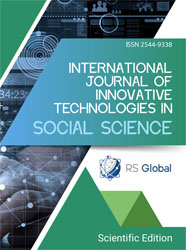THE HISTORICAL BACKGROUND TO THE DEMOCRACY OF MODERN GEORGIA
Abstract
Georgia was a part of a totalitarian state for 70 years, but if we look back through its history, we find out that the conceptual foundations of the Georgian statehood had been prepared by the legacy of the public figures of previous epochs. The views of different historical periods and the legacy of the public figures conditioned the vector of the development of today's Georgia and the respect for the democratic values. The article is about historical experience of Georgia which has an influence on the political life of modern country.
References
Batiashvili Elbert, Conversations about Ilia, Tbilisi, 2012, pp. 46-47.
Lortkipanidze S., “The Christian Ideal of Governance and the Kings in Archil's Works” Batumi, 2016, pp. 15-16.
Samushia J., Kurtlu-Arslan - Initiator of Great Changes (Georgian Parliamentarism), Istoriani, June 6, 2016, p. 35.
Javakhishvili I., History of Georgia, Vol. 2, Tbilisi, 1983, pp. 408-410.
Javakhishvili Iv.,Berdzenilvili N., Janashia S., The History of Georgia, Part I, the USSR State Publishing House of Georgia, Tbilisi, 1948, p. 235.
Collection of Legal Acts of the Democratic Republic of Georgia 1918-21, Special Editor V. Sharashenidze, Tbilisi, 1990, pp. 84-109.
The First Universal Democratic Elections in Independent Georgia, Iv. Javakhishvili Tbilisi State University, the CEC, Tbilisi, 2017, pp. 18-66.
Javakhishvili M., Based on the History of the Women's Movement, Iveria, 1906, #9, pp.14-15.
Views:
419
Downloads:
282
Copyright (c) 2022 Lili Amashukeli, Tamar Kiknadze

This work is licensed under a Creative Commons Attribution 4.0 International License.
All articles are published in open-access and licensed under a Creative Commons Attribution 4.0 International License (CC BY 4.0). Hence, authors retain copyright to the content of the articles.
CC BY 4.0 License allows content to be copied, adapted, displayed, distributed, re-published or otherwise re-used for any purpose including for adaptation and commercial use provided the content is attributed.











